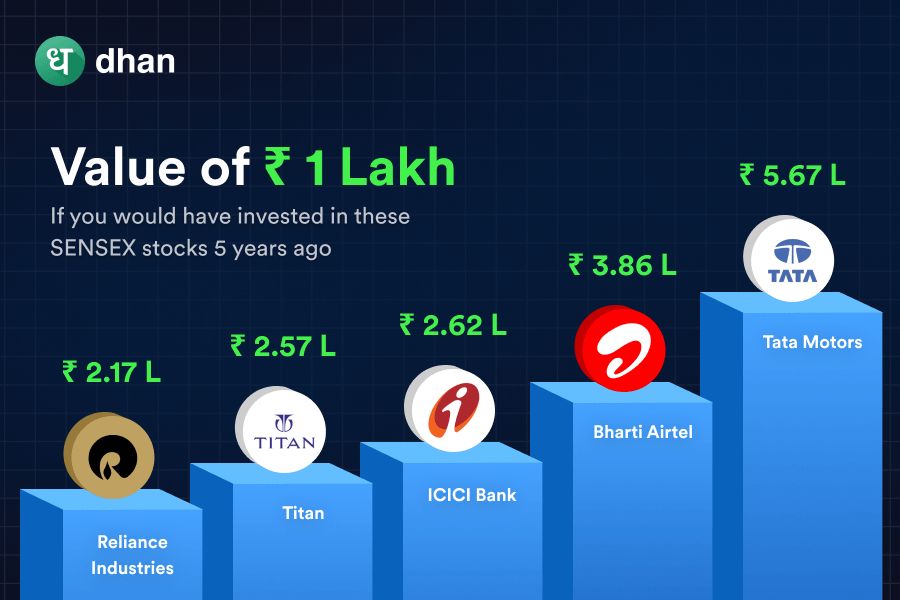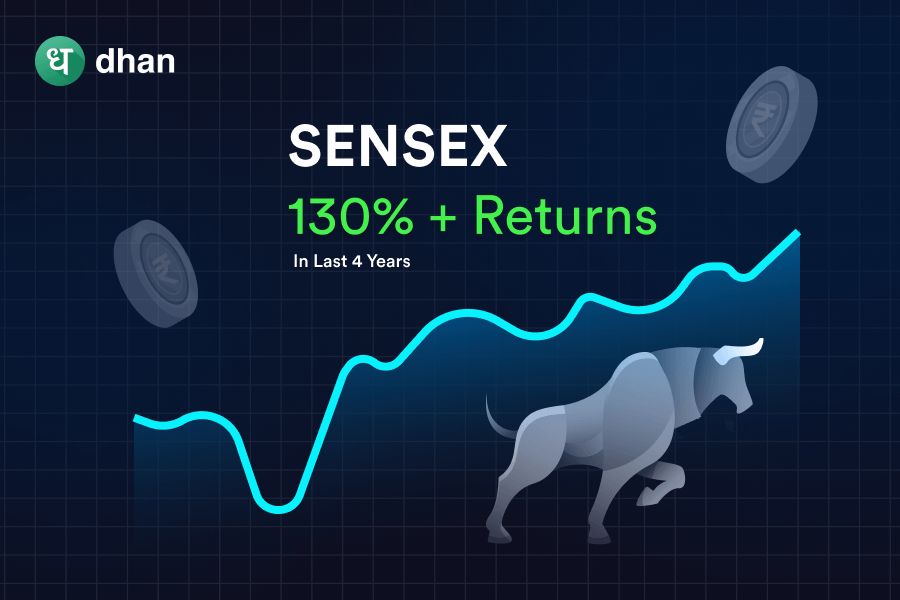Over the last four years, the Bombay Stock Exchange (BSE) Sensex has experienced an extraordinary surge of 130%. This remarkable growth has been driven by strong fundamentals in the Indian economy and well-performing companies listed on the BSE.
However, this leaves a question in the minds of most investors: is it still good to put money in Sensex? Let’s analyse the same in this article.
Analysis of Sensex Performance
The S&P BSE Sensex, a benchmark index of the Bombay Stock Exchange, has seen significant growth over the past four years (2020–2024). In just four years since April 2020, the Sensex has yielded the highest compound annual growth rate (CAGR) of 25%. This is a remarkable achievement considering that during the period from 1990 to 2000, the Sensex delivered a CAGR return of 20.4%.
The Sensex today stands at around 74,000+. The index has seen a rise of 3170 points, or 4.39%, since the beginning of 2024. Despite already lofty valuations, analysts predict that India’s stock market will surge to new highs by the end of June and gain nearly 9% in 2024. This growth reflects the exceptional performance of major companies listed on the Bombay Stock Exchange and the overall positive sentiment in the Indian economy.
Can You Still Invest in Sensex?
Indeed, time in the market is always more important than timing the market. Historically, the Sensex has shown consistent growth over extended periods. For example, for the last five years, it has grown from around 40,600 to 74,000, which is an increase of around 82%. Over a period of ten years, the growth is even higher and equals approximately 210%. If we stretch this timeline to 15 years or more, it will become an explosion with returns of over 393% from Sensex.

These figures illustrate the potential of the Sensex as a long-term investment. The key is to focus on the long term, as value is derived from staying invested. Sensex includes India’s leading company, which represents the overall growth. This growth is likely to multiply as the years pass. This means the Sensex still has potential for future growth, even with the recent appreciation in value it witnessed. However, you need to focus on the long term and stay invested.
To invest in Sensex, all you need to do is open a demat account on Dhan for free to analyse market trends, explore charts, and access unique features tailored to your needs.
Factors to Consider When Investing in Sensex
Investing in the Sensex can provide exposure to some of the largest and most influential companies in India, spanning various sectors such as banking, IT, FMCG, automobiles, pharma, and more. This means you can take advantage of the growth and innovation of these companies without putting all your eggs in one basket.
With that said, whether or not to continue investing in Sensex is determined by a number of factors. Here you should often look at this when deciding to invest in a market like Sensex:
1. Market valuation
When you look at how much companies are worth compared to how much money they make (like their profits), it's called 'valuation'.
If the valuation is very high, it might mean that the market is too expensive, and stocks might be overpriced. This could lead to a situation where prices drop to a more reasonable level, which is known as a correction.
So, investors pay close attention to valuation to figure out if it's a good time to keep investing or if they should be cautious.
2. Economic Indicators
Keep an eye on big-picture economic clues like how much the country's making (GDP growth), how prices are behaving (inflation rates), and what banks are charging for loans (interest rates).
When these things are looking good, it usually means the country's doing well. And when the country's doing well, that usually helps the stock market too.
So, if the economy's strong, it might be a good sign for the stock market too, like the Sensex.
3. Corporate Performance
Assess the performance of companies within the index. You want to see if they're making more money (revenue growth), if their profits are going up (earnings per share), and if they're playing by the rules (corporate governance).
When companies are doing well and following the rules, it usually means their stock prices can go up.
So, if the companies in the stock market, like the ones in the Sensex, are doing great, it's a good sign for investors.
4. Global Market Trends
Think about what's happening in other countries and if there are any big global events shaking things up. Sometimes, stuff happening far away can affect our stock market too.
For example, if a major country's economy starts to struggle or there's a big political problem somewhere, it can make investors here feel nervous and might even cause our stock market, like the Sensex, to go down.
So, it's important to keep an eye on what's happening around the world too.
5. Regulatory Environment
Keep tabs on the rules and laws that the government makes about money and investing. These can change and sometimes affect how the stock market works. If the government brings in new taxes or changes the rules, it could impact how much money companies make and how people invest.
So, it's important to know what the government's up to, especially if you're thinking about putting money into the stock market, like the Sensex.
6. Market Sentiment
Check out how people feel about the market—are they mostly excited or worried? Sometimes, if everyone's super excited and buying up lots of stocks, it could mean things are getting a bit too hot.
On the flip side, if everyone's super worried and selling off their stocks, it might be a sign that things are getting too cold.
So, it's good to keep an eye on how everyone's feeling about the market to get a sense of where things might be heading.
Conclusion
The Sensex’s historical performance indicates that it can be a viable investment option for those with a long-term perspective. In light of the Sensex growing by over 130% in the last four years, many retail investors are turning to platforms like the Dhan Trading App to seamlessly continue their investment journey.
Despite market fluctuations, the Sensex has consistently shown substantial growth over extended periods. The key to reaping the benefits of this growth is not timing the market, but time spent in the market. With a long-term perspective, BSE Sensex remains a promising avenue for investors.
This article has been produced on behalf of Dhan by ABP Digital Brand Studio.











